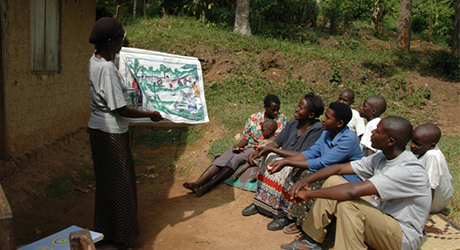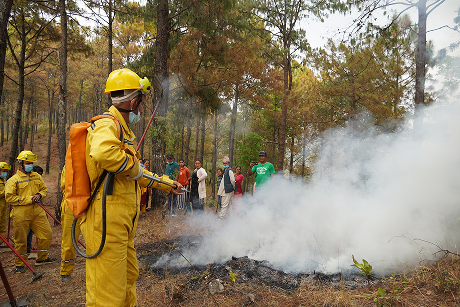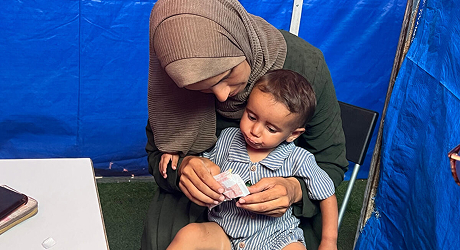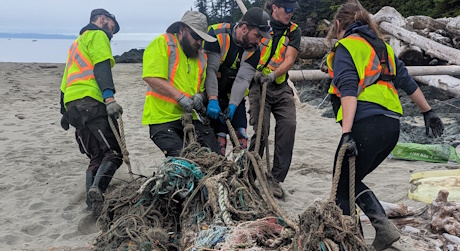Footprints Project
Since 2005, travelers like you have helped us change the world through micro-donations.

-
A total of
3879
Travelers
-
donated
$24790.57
(100% funded) -
to help improve
Sustainable Communities
-
impacting
270
people -
in
Uganda
Project Background
A UNESCO World Heritage Site, Bwindi Impenetrable National Park is home to 43% of the remaining 1,063 endangered mountain gorillas and is one of two remaining strongholds for the species. Surrounded by some of the poorest communities in Uganda, with very limited access to health and social services, the park and its wildlife are under serious threat from human activity.
As mountain gorillas share 98.4% DNA with humans, they are highly susceptible to human diseases. Poor health, hygiene and sanitation amongst community members living in proximity with the gorillas, coupled with increasing pressure for natural resources and increased contact between the gorillas and people, poses a major risk for transmission of human diseases to the gorillas.
Conservation Through Public Health engages community volunteers under the mandate of the Ministry of Health and trains them to become Village Health and Conservation Teams (VHCTs) who offer integrated health and conservation communication to households and community members. These VHCTs help increase access to key health services and empower community members to live healthier lives; in doing so, they help reduce the risk of zoonotic disease transmission between people and wildlife – including, for example, COVID-19. .
Key project activities
In 2022, CTPH launched a ‘Model Household’ initiative to support community members to improve and ensure their own health and wellbeing while living alongside gorillas and other wildlife. This was done by investing in proper hygiene and sanitation, prioritizing wildlife conservation and reproductive health, practicing sustainable agriculture and other alternative livelihoods, and reducing threats to the mountain gorillas caused by zoonotic diseases, illegal activity, and poaching.
With support from World Nomads, CTPH conducted refresher trainings on the Model Household approach with 12 ideal “One Health” indicators for 326 VHCTs. This included the VHCTs recruited to fill the gaps of those who retired. During the training, strategies to improve performance indicators in the model households were laid out clearly.
Based on historical data, key knowledge and information needs were established to support development of the Information Education and Communication (IEC) materials for VHCTs, furthering our efforts to support behavior change.
With additional support from Whitley Fund for Nature (WFN) and National Geographic Society (NGS), we scaled up our VHCT program to two additional parishes with high human and gorilla conflict, Muramba and Ngara; CTPH recruited 75 VHCTs and 2 Parish Coordinators. This increased the parishes from 6 to 8, trained VHCTs from 270 to 429, and households reached from 7,616 to over 10,000.
With support from NGS and Tusk Trust, CTPH held a stakeholders’ engagement meeting at the Gorilla Conservation Camp at Bwindi in June 2023, attended by more than 69 key partners and community leaders (48 male, 21 female). CTPH’s programs and achievements were shared with relevant stakeholders who helped to shape the annual workplan, enhancing buy-in, support and sustainability of our community programs.

Key project outcomes
All 429 (100%) VHCTs engaged by CTPH have received training on priority One Health and conservation issues and service provision and equipped with tools to help with behavior change communication.
Through our VHCTs model, approximately 53,600 individuals (51% female, 50% under 18 years of age) in 10,600 households in 59 frontline villages around BINP were familiarized with the practical application of integrated health and conservation activities, helping them easily identify steps to improve their health and wellbeing and reduce their potential for negative impacts on wildlife. There has been a 35% improvement from 22% to 53% of households (model households) in the ‘Green’ category from the first quarter of 2022 to the last quarter of 2023. The ‘Green’ category represents households that meet at least 9 out of 12 of the One health key performance indicators. This has helped to significantly improve community health, hygiene, sanitation, and economic well-being and increased manageable family sizes, translating into reduced incidences of zoonotic diseases.
Community involvement
One of CTPH’s Goals is “To enhance active community participation in conservation.” Community members and stakeholders are routinely engaged in the CTPH One Health Program through regular dialogue and participatory activity implementation, fostering a collaborative approach to project implementation. Community members and stakeholders contribute valuable insights, experiences, and local knowledge, enriching the program's understanding of local needs and challenges during our program evaluations. Their voices play a pivotal role in shaping project interventions, as feedback from community members and our local partners (which include local government officials, community health facility workers and Uganda Wildlife Authority) ensure that initiatives remain relevant, impactful, and responsive to community priorities.
These partners are involved in all the interventions carried out, including various volunteer training and identification of beneficiaries for special projects like “Ready to Grow” to ensure sustainability.
What's next?
Providing mentoring and support supervision for VHCTs is a continuous process, ensuring steady progress of project outcomes and quality service delivery.
The process of developing IEC materials for VHCTs is still ongoing. In the next VHCT training, samples will be tested and reviewed to ensure relevancy and active participation by the end user. Final copies will then be developed and distributed to all VHCTs for use during their routine behaviour-change communications at both the household level and during community social gatherings.
The "Ready to Grow" Project
Building on the successful implementation of a similar project with 1,001 beneficiaries in 2020 (funded by IUCN) and 500 beneficiaries in 2022 (funded by Wildlife Conservation Network), in 2024 CTPH rolled out a 3rd and largest phase of the “Ready to Grow” project benefiting 1,500 households, 500 of which were supported by Babel Foundation and 1,000 by NGS.
In consultation with Uganda Wildlife Authority (UWA) community conservation department, the Subcounty Chief Development Officer, Village leaders and VHCTs, we identified 1,500 most vulnerable households in locations with the highest poaching incidences to benefit from the 1st round of this third phase. A package of ten low-maintenance food crop seedlings that need little space, providing food within 1-4 months, have been provided to these households. This aims to reduce food insecurity and illegal forest entries for food – especially poaching for wild meat – and enable homes to transform into model households around Bwindi Impenetrable National Park.
Traveling soon? When you buy travel insurance with us, you can make a contribution towards a cause you care about.
Get a quote






